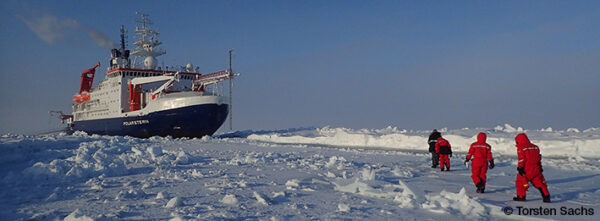
SPECIAL ISSUE FREELY AVAILABLE NOW

The changing Arctic Ocean
and new research in the UK and Russia
The Arctic Ocean is the fastest warming region on Earth. In the new Special Issue of The Marine Biologist magazine we focus on concerted international scientific efforts to better understand the changing Arctic Ocean. From phytoplankton to polar bears and permafrost, the stories and images from UK and Russian contributors give an authentic flavour of this cold and remote ocean, and its global importance.
Highlights include Changing Arctic Ocean projects with close links with researchers in Russia, an article on MOSAiC, the biggest Arctic expedition in history, and a conversation with Professor Dame Jane Francis, Director of the British Antarctic Survey, about the future of ship-bome polar research. This is complemented by an A3 pull-out poster of the UK’s new polar research vessel the RRS Sir David Attenborough*.
In addition, a superb double page map of the Arctic Ocean and bordering countries has been specially produced for this edition, placing key locations, expedition routes, and other information relevant to the articles.
The full Special Issue is now freely available online.
Delivered four times a year to Marine Biological Association members, The Marine Biologist is just one of the benefits of membership. Sign up now and be part of the international community!
The Marine Biological Association is a Royal Charter body with a growing membership in over 40 countries. For more information about joining, visit: https://www.mba.ac.uk/membership
Access to The Marine Biologist magazine is usually an exclusive benefit of MBA membership, however, we are releasing this Special Issue on Open Access. It is now freely available online at: https://www.mba.ac.uk/issue-18
Find out more about The Marine Biologist at: https://www.mba.ac.uk/marine-biologist
The full catalogue is available to Members on the member portal. Older back issues are available at: https://www.yumpu.com/user/marinebiologist